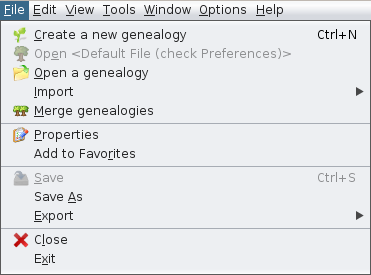Menu Bar (L)
Logic for menu layout
To easily find the actions/commands, here is the layout we chose to adopt for Ancestris's menus.
File Menu
Groups all actions regarding handling genealogy files.
- Create, open, close, save, import, merge, export, change its properties, add to favorites
- Exit
Edit Menu
Groups all actions regarding changing data.
- Undo / Redo
- Cut / Copy / Paste
- Find / Replace / Delete
- Generate Sosa numbers or other numbering
- Marking individuals
- See modifications history
View Menu
Groups all actions regarding access to the genealogical views, that allow us to work with the data.
- Editors are views and some views allow editing. Editors are therefore arranged here.
Tools Menu
Groups all actions regarding exploration of genealogical data.
- Genealogical Search, recover deed data
- Registers Records
- Miscellaneous utilities (date calculation, calculator)
- Check data (anomalies, duplicates)
- Analyse data (common ancestors, lists and reports)
- Publish
Window Menu
Groups all actions regarding window handling.
- Access to special windows
- Handling windows : open, close, anchor, clone windows in general, full screen
Options Menu
Groups all actions regarding customising Ancestris.
-
- Preferences
- Configure tools bar
- Update Ancestris
- Manage Plugins
Help Menu
Groups all actions regarding documentation and how to get help and the Ancestris Community
Using the menus
Like the menu bar in many software programs, each menu in the Ancestris menu bar can be opened in two ways.
- or by clicking on it
- or by typing the key combination: <Alt> + the underlined letter in the name of the corresponding menu. For example, to open the Tools menu, type <Alt>+t.
Each menu has actions/commands. An action comprehends:
- the icon illustrating the action, when this icon exists
- the title of the action
- the keyboard shortcut to launch this action without going through the menu
Here is an example with the File menu
Similarly, each action can be initiated in several ways.
- either by clicking on it in the menu
- or when the menu is opened by typing the key combination: <Alt> + the underlined letter in the action name
- or when the menu is closed by typing the keyboard shortcut of the action (Ctrl-N or Ctrl-S in the example above)


